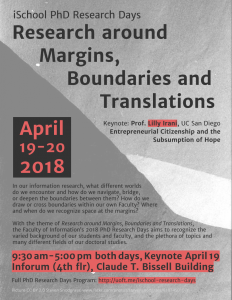2018 PhD Research Days
iSchool PhD Research Days 2018
Research around Margins, Boundaries and Translations
April 19-20, 2018
Inforum (4th flr), Claude T. Bissell Building, 140 St George Street
We invite the Faculty of Information and broader University of Toronto community to join us at PhD Research Days 2018: Research around Margins, Boundaries and Translations
The concept of Boundary Objects in the production of knowledge has been taken up across a number of information fields (e.g., Acker, 2017; Akkerman & Bakker, 2011; Duff & Harris, 2002; Hall, 2013; Lee, 2007; Yakel, 2002). While the understanding and use of boundary objects has evolved over the past three decades, Star & Griesemer’s (1989) original paper on the topic describes boundary objects as “objects which are both plastic enough to adapt to local needs and the constraints of the several parties employing them, yet robust enough to maintain a common identity across sites.” They further extend the analogy:
For people, managing multiple memberships can be volatile, elusive, or confusing; navigating in more than one world is a non-trivial mapping exercise. People resolve problems of marginality in a variety of ways:
by passing on one side or another, denying one side, oscillating between worlds, or by forming a new social world composed of others like themselves.
However, management of these scientific objects–including construction of them–is conducted by scientists, collectors and administrators only when their work coincides. The objects thus come to form a common boundary between worlds by inhabiting them both simultaneously. Scientists manage boundary objects via a set of strategies only loosely comparable to those practised by marginal people.
With the theme of Research around Margins, Boundaries and Translations, the Faculty of Information’s 2018 PhD Research Days aims to recognize the varied background of our students and faculty, and the plethora of topics and many different fields of our doctoral studies.
In our information research, what different worlds do we encounter and how do we navigate, bridge, or deepen the boundaries between them? How do we draw or cross boundaries within our own Faculty? Where and when do we recognize space at the margins? Is the concept of the marginal useful or relevant in our work, and if so, should it be re-centered? Are we committed to engaging in ‘cooperative work without consensus’, and when or how is conflict otherwise resolved?
Our keynote speaker is Prof. Lilly Irani (UC San Diego), whose research investigates the cultural politics of high-tech work practices with a focus on how actors produce “innovation” cultures. Dr. Irani’s forthcoming book is titled Innovators and their Others: Entrepreneurial Citizenship in Indian Development.
Bibliography
Akkerman, S. F., & Bakker, A. (2011). Boundary crossing and boundary objects. Review of educational research, 81(2), 132-169.
Duff, W. M., & Harris, V. (2002). Stories and names: archival description as narrating records and constructing meanings. Archival Science, 2(3-4), 263-285.
Hall, H. (2003). Borrowed theory: applying exchange theories in information science research. Library & Information Science Research, 25(3), 287-306.
Lee, C. P. (2007). Boundary negotiating artifacts: Unbinding the routine of boundary objects and embracing chaos in collaborative work. Computer Supported Cooperative Work (CSCW), 16(3), 307-339.
Star, S. L., & Griesemer, J. R. (1989). Institutional ecology,translations’ and boundary objects: Amateurs and professionals in Berkeley’s Museum of Vertebrate Zoology, 1907-39. Social studies of science, 19(3), 387-420.
